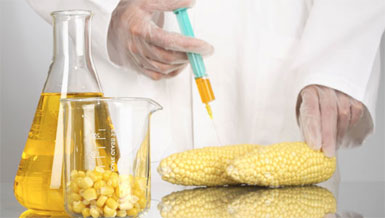One of the sad things about modern agriculture is how few strains of food we eat in much of the world.
Since the 1990s, three-quarters of the world’s plant genetic diversity has been lost, according to the United Nations Food and Agriculture Organization (FAO) because big agriculture has successfully convinced farmers to plant monocultures that consist of a few genetically uniform, high-yielding crops, reports Reuters.
Today, 75% of the world’s food comes from just 12 plants and five animal species, says FAO.
Much has been written about the nutritional problems that stem from this (ie, books like Wheat Belly), the loss of pollinators that thrive on diversity, the inability to grow crops during severe drought, and the much greater use of pesticides that comes with monoculture crops.
Small farmers hold the key to retaining plant diversity because they – and seed banks – are preserving ancestral seeds, but with GMO companies pushing into Africa and other developing regions, even they are threatened.
Small farmers know enough to rotate through versions of staple crops, and to plant several kinds of crops at the same time to increase resiliency. In other words, they farm organically.
By diversifying food production instead of limiting it, we can increase the nutritional value of foods and protect our food systems from the increasing shocks to the system from climate change.
GMOs Push Into Africa
But the US and GMO companies are force-feeding monocultures into unsuspecting Africa, through "assistance" programs offered through the Bill and Melinda Gates Foundation.
So far, only South Africa, Egypt, Burkina Faso and Sudan allow commercial GMO crops. While Europe and other regions have developed strong biosafety laws, the GMO industry is rushing to take advantage of the lack of regulation in Africa.
The vast majority of farmers in Africa are small – they can’t afford to buy expensive GMO seeds or the fertilizer/ pesticide treadmill they require. But Monsanto et. al. have very effective marketing campaigns spinning that GMOs provide food security; the ability to produce more on less land (environmentally safe too!); and that a large population can’t be fed using traditionally ways of farming.
Take the Water Efficient Maize for Africa (WEMA) program, a partnership between the Gates Foundation and Monsanto. The idea was to introduce drought tolerant maize varieties in five pilot countries – the traditional staple food – which, of course, includes Monsanto’s MON810, which enables the plant to produce its own pesticide.

In Manipulate and Mislead: How GMOs Are Infiltrating Africa, the authors say:
When they introduce GMOs, they also shape government policy. "The project has refused to run field trials in Tanzania and Mozambique until those countries amend their "strict liability" laws, which will make WEMA, and future companies selling GMOs, liable for any damages they may cause. WEMA has also complained to governments about clauses in their law that require assessment of socio-economic impacts of GMOs, saying that assessment and approvals should be based solely on hard science, which is also often influenced or financed by the industry.
"The majority of these farmers are women, who have scant access to finance or secure land tenure. That they still manage to provide the lion’s share of the continents’ food, usually without formal seed, chemicals, mechanisation, irrigation or subsidies, is testament to their resilience and innovation. African farmers have a lot to lose from the introduction of GMOs; the rich diversity of African agriculture, its robust resilience and the social cohesion engendered through cultures of sharing and collective effort could be replaced by a handful of monotonous commodity crops owned by foreign masters.
"It may be tempting to believe that hunger can be solved with technology, but African social movements have shown that skewed power relations are the bedrock of hunger, such as unfair trade agreements and subsidies that perennially entrench poverty, or the patenting of seed and imposition of expensive and patented technology onto the world’s most vulnerable and risk averse communities.
"Without changing these fundamental power relationships and handing control over food production to smallholders in Africa, hunger cannot be eradicated. A global movement is growing and demanding that governments support small-scale food producers and "agroecology" instead of corporate agriculture, an agricultural system that is based on collaboration with nature and is appropriate for small scale production, where producers are free to plant and exchange seeds and operate in strong local markets."
Last year, the "Global GMO Free Coalition" formed to stop the GMO industry from taking over the world’s food supply.
"The agrochemical-based global farming system, infatuated as it is by GMOs, is waging a full scale chemical war against the biosphere, of which we form an inseparable part. Calling this farming is the ultimate absurdity, as this food production system requires the inevitable destruction of the soil, the biodiversity and even the producers and consumers who eventually must succumb to suboptimal nutrition and poisoning," says Sayer Ji, Founder of US-based GreenMedInfo.
Read our article, US Government is Monsanto’s Sales Rep and UN Report: Eco-Farming Can Double Food Production in 10 Years.
Read, Who Benefits From GMO Crops? The expansion of agribusiness interests in Africa through biosafety policy:
